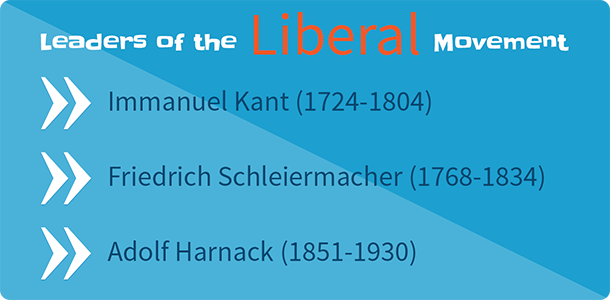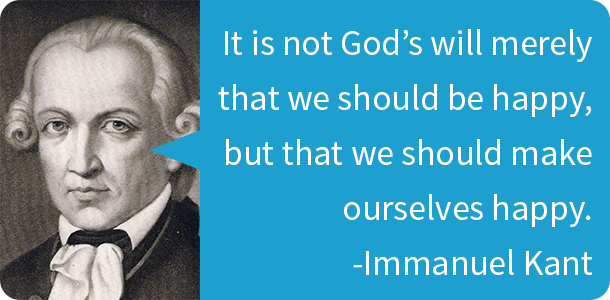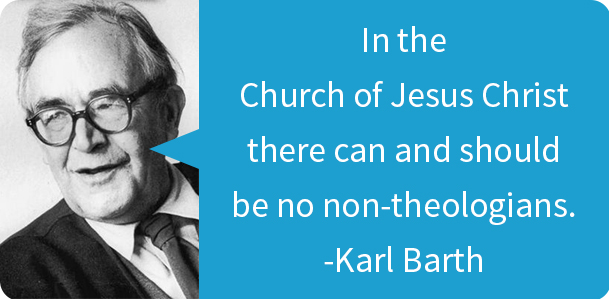There have been three major theological positions regarding Scripture in the 20th and 21st centuries: liberalism, neo-orthodoxy, and orthodoxy. There are subsets and nuances of these three theological positions. Each has its own unique view of the inerrancy and sufficiency of Scripture.
1. Liberal Minds
Liberalism can trace its beginning to the age of the Enlightenment. The Enlightenment is the period in the history of western thought and culture stretching roughly from the mid-decades of the 17th century through the 18th century, characterized by dramatic revolutions in science, philosophy, society and politics; these revolutions swept away the medieval worldview and ushered in our modern western world.[i][1]
A prominent historical figure in the Enlightenment was the German professor of philosophy, Immanuel Kant (1724-1804).[2] He denied the possibility of objective truth of anything metaphysical. He argued we could have some knowledge, but only knowledge of things that would be tested. Kant would not accept divine revelation was found in the Bible as a source for knowledge. He claimed that religion had to be based on human reason.
Human reason reigned supreme in the Enlightenment instead of any supposed revelation from God found in the Bible. Men like Kant and others said that revelation had to be examined using human reason. Reason refused to accept the miracles in the Bible because they were seen as contrary to human reason.
A second leading figure in liberalism was Friedrich Schleiermacher (1768–1834)[3] who was a German theologian, preacher, and classical philosopher. Kant’s views on the inerrancy of Scripture had left Christianity devoid of any transcendence. How can rational humans connect with anyone or anything beyond human experience? And how could Christianity ever survive if it had nothing to offer outside of human knowledge? Schleiermacher’s response was to base Christian faith on experience. He contended that the heart of religion was feeling and that personal experience was of absolute necessity to Christianity.
Schleiermacher published his theology in 1821 in The Christian Faith. He presented Christianity not as a set of beliefs and obligations based on the Bible, but as a result of man’s feelings of absolute dependence. He wrote that Christianity brings man into harmony with God as man passively realizes his dependence on God. He found many doctrines like the Trinity dispensable because they had nothing to do with religious experience. He became the father of liberal theology, a theology that is based on something other than biblical revelation.
Adolf Harnack (1851–1930), prominent German theologian and church historian,[4] carried the banner of liberalism into the 19th and 20th centuries. His theology can be summarized in three principles: the universal fatherhood of God, the brotherhood of man, and the infinite value of the individual soul. Although the four gospels had been regarded as authoritative since the second century, Harnack rejected the Gospel of John, suggesting it was without historical value regarding Jesus’ actual life.
Liberalism was a sharp deviation from the widely-held belief in the inerrancy and sufficiency of the Bible for the first 1,600-1,700 years of church history. Liberalism denied the traditional position of the Scripture. It argued that special revelation from God could not be accepted by “modern” man. Liberalism argued that reason was king, and revelation was not necessary.
2. The Birth of Neo-Orthodoxy
As World War I spread across Europe, a Swiss pastor by the name of Karl Barth recognized that his liberal view of Christianity left him with nothing to say to his congregation — he had a crisis of belief. Barth (1886-1968) was the most important Swiss theologian of the 20th century, with an influence far beyond Switzerland.[5]
In response to his realization, Barth turned back to Scripture and became the father of what has become known as neo-orthodoxy. He believed in the transcendence of God and that man is helplessly sinful. However, he stopped short of affirming the complete inerrancy of the Bible. He argued that the Bible was a human book, and it was subject to criticism like any other book. Barth said that the Bible was a witness to divine revelation rather than being an inspired, objective, historical, propositional revelation in itself.[6] He was rarely bold enough in his Church Dogmatics to identify “mistakes” in the Bible. He did not place reason over Scripture on certain points, yet he failed to fully embrace Scripture as divine revelation. Barth argued that the Bible becomes the revelation of God if God chooses to use it to encounter us, but it does not have the characteristic of being revelation in and of itself. He also contended that the Bible revealed God Himself, not so much as information. God Himself, according to Barth, is the focus of the Bible.
3. Orthodoxy and the Fundamentals
Orthodoxy is the third major position and was essentially the majority position for the first 1,800 years of Christian history. Until the Enlightenment, the inspiration, inerrancy, infallibility, and sufficiency of Scripture was virtually never questioned. The early church fathers such as Clement of Rome, Irenaeus of Lyons, John Chrysostom, and Tertullian showed their full confidence in the Word of God through their writings.
During the Reformation, one of the major emphases was the authority of the Bible versus the authority of the Roman Catholic Church. This charge was led by men like Martin Luther, John Calvin, Huldrych Zwingli, and John Knox. The men God used to bring a spiritual awakening in Europe and America, including Jonathan Edwards, George Whitfield, and Charles Spurgeon, demonstrated and articulated their full confidence in God’s Word through their writing and preaching.
In response to liberalism in America, in 1909, California businessman Lyman Stewart commissioned the writing of essays on the fundamentals of Christianity. One of these fundamentals was the full inspiration and inerrancy of the Bible. These essays were eventually published in a 12-volume set known as The Fundamentals. Considerable writing and emphasis was placed on the reliability of the Bible as a divinely-inspired book that was free of error and the sole authority of the Christian faith and practice.
Men who held to an orthodox view of Scripture in the early to mid-20th century included: Carl F. H. Henry, Lewis Sperry Chafer, and Charles E. Fuller. The crowning moment for the orthodox view of Scripture was the crafting and signing of the “Chicago Statement on Biblical Inerrancy.” The statement was formulated in October 1978 by more than 200 evangelical leaders at a conference sponsored by the International Council on Biblical Inerrancy, held in Chicago. Signers included James Montgomery Boice, John F. MacArthur, Jr., D.A. Carson, W.A. Criswell. D. James Kennedy, Paige Patterson, and R.C. Sproul.
Why Are These Views of Scripture Important?
- Human reason that liberalism emphasizes is limited. Humans are finite beings. Humanity cannot know all that there is to know. Human reason has its limits. Human reason cannot transcend the boundaries of time, space and suffering. We need a word from God who is transcendent and without limits. We need a word from God that addresses our sin, our pain, and our death. God has to reveal truth to humanity that is above our ability to reason.
- Personal experience that neo-orthodoxy emphasizes is subjective. Who is to judge whether one’s personal experience is legitimate? What makes one’s personal experience authoritative over another? My personal experiences in life can be affected by anything from how much sleep I have had, to my education and upbringing. There is no rule or guide to judge or authenticate personal experiences. God’s Word comes from God Himself who is above personal experience. God’s Word informs me whether or not my personal experience is legitimate or false. Without the rule of Scripture, we would be afloat on a sea of emotionalism. The Bible anchors us in a world that is full of personal upheavals and confusion.
- Divine revelation that orthodoxy emphasizes is authoritative. Orthodoxy places revelation first and trusts the Bible as God’s authoritative and inspired Word. It seeks to submit to Scripture in all matters related to Christian faith and practice. The Bible tells me whether my experience is from God or not. The Bible is an authority outside of myself. It is completely trustworthy for the human experience.
[1] http://plato.stanford.edu/entries/enlightenment/
[2] http://www.egs.edu/library/immanuel-kant/biography/
[3] http://www.britannica.com/EBchecked/topic/527577/Friedrich-Schleiermacher
[4] http://www.newworldencyclopedia.org/entry/Adolf_Harnack
[5] http://kbarth.org/biography/
[6] Christianity through the Centuries, 3rd edition, by Earle E. Cairns, Zondervan Publishing, Grand Rapids, Michigan, 1996, page 463.






